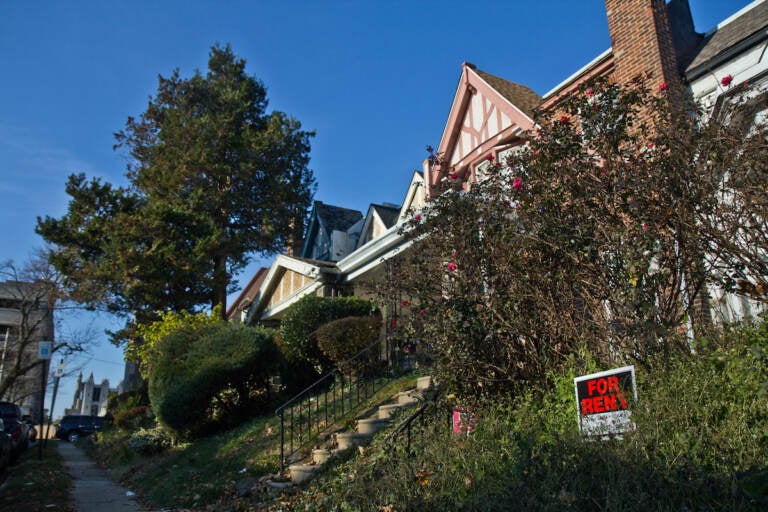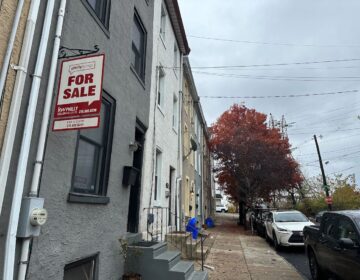Council on track to pass bill barring Philly landlords from ‘price-fixing’ rents
The measure gives the city the ability to sue violators on behalf of tenants.
Listen 1:16
Church Road in Philadelphia’s Wynnefield neighborhood has moved from mostly middle-class family ownership to rental properties for students. (Kimberly Paynter/WHYY)
Have a question about Philly’s neighborhoods or the systems that shape them? PlanPhilly reporters want to hear from you! Ask us a question or send us a story idea you think we should cover.
City Council advanced legislation Wednesday that’s designed to hold corporate landlords accountable for “price-fixing” rental rates in Philadelphia.
Under the antitrust measure, violators could be sued and face stiff fines for coordinating monthly rent, an illegal practice housing advocates say hurts low-income renters by undermining competition and fairness in the marketplace amid an affordable housing crisis.
The bill does not expressly target revenue management software like RealPage. But the measure is meant to bar landlords from using those programs, and their proprietary algorithms, to artificially inflate the cost of housing.
These algorithms combine publicly available and privately shared data — including current rents, lease terms and vacancy levels — to generate and recommend rental prices. Advocates say these programs encourage corporate landlords to squeeze low-income tenants, potentially putting them in danger of being displaced or becoming homeless.
“Algorithmically-generated recommendations keep unit prices pressed up against the price ceiling for local markets regardless of the state of the market or the tenants who have historically resided in those areas. And it’s the tenants that I have, and many of us, have been elected to protect,” said Councilmember Nicolas O’Rourke, who introduced the bill, during a hearing before Council’s Committee on Housing, Neighborhood Development and the Homeless.
RealPage did not immediately respond to a request for comment Wednesday.
O’Rourke’s measure comes as rental rates in the city remain historically high. And as housing activists continue to call on corporate landlords to provide better living conditions and lower rents for people with low incomes.
Lori Peterson, a retired city employee who lives on a fixed-income, told council members she’s tired of paying so much for an apartment that’s often infested with cockroaches, but like many low-income tenants, cannot afford to move. She said reigning in price-fixing would help improve the lives of Philadelphia’s most vulnerable residents.
“I feel like I am in a prison in my own home and I’m paying for it,” said Peterson, a retired city employee who lives on a fixed-income.
If passed, the city could file suit on behalf of tenants. Renters could also sue landlords directly.
Landlords could be forced to pay $2,000 per violation. Each “prohibited action” would be counted as a separate violation and the fine would be imposed for each day it “occurs or continues.”
A private plaintiff would be entitled to three times the value of the actual damages, or $2,000 per violation.
It is unclear how violators would be identified or how the law would be enforced.
Landlord groups are pushing back on the legislation. They argue it would unnecessarily restrict the use of a technology that — they say –- enhances transparency, efficiency and competition.
Opponents maintain that programs like RealPage are not used to “extort” renters or “maximize” profits, and that the federal government is better suited to govern this technology.
“By harnessing analytics, dynamic pricing, and predictive models, housing providers can stay competitive in the market and enhance resident satisfaction. This tech-driven approach not only benefits housing providers but also fosters a healthier, more transparent and competitive rental market for residents,” said Steven Chintaman, vice president of government affairs for the Pennsylvania Apartment Association, in written testimony submitted to Council.
In August, the U.S. Department of Justice filed suit against RealPage in partnership with the attorneys general of North Carolina, California, Colorado, Connecticut, Minnesota, Oregon, Tennessee and Washington.
Pennsylvania Attorney General Michelle Henry did not join the suit. A spokesperson would not say why, adding “we generally do not comment in such circumstances.”
O’Rourke’s bill must still be passed by the full council and signed by Mayor Cherelle Parker.
The measure has a veto-proof majority and Parker’s administration backs the legislation, in part because of its goal of expanding and preserving affordable housing in Philadelphia.
“In a city where affordable housing is scarce, such practices push many renters into financially precarious situations or even homelessness,” said John Mondlak, interim director for the city’s Department of Planning and Development. “It’s vital to take proactive measures to prevent predatory practices that disproportionately harm low-income residents.”

Subscribe to PlanPhilly
WHYY is your source for fact-based, in-depth journalism and information. As a nonprofit organization, we rely on financial support from readers like you. Please give today.








